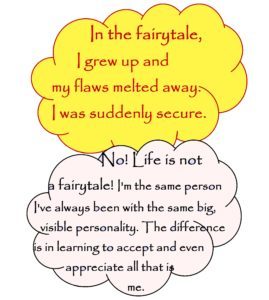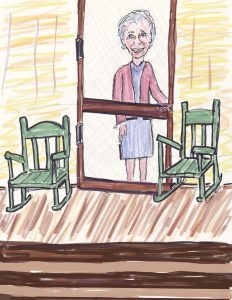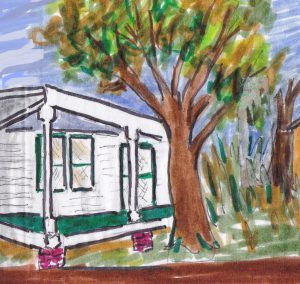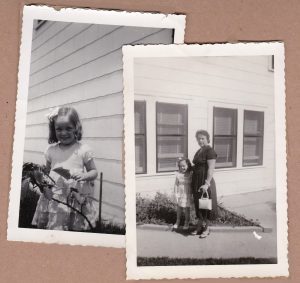Ruthi Postow Birch's Blog, page 16
March 29, 2017
How to Set Goals That Matter To You
Last week, I wrote about the reality of achieving a goal I had worked long and hard for and the unexpected feelings I had afterwards. The goal was to graduate from college with a degree in history and education. I reached it, but I wasn’t happy – I was miserable. Why? Because that goal was never really mine. I’d achieved it and then became adrift and without direction. Setting goals is easy. Setting goals which matter is another story.

Picture of me when I graduated college
Goal origins and our choices
Our original values and goals are given to us by our parents who got theirs from their parents, and so it goes. We accept these goals and act on them, until one day we discover that they don’t make us happy because they don’t matter to us or take us to places where we want to be.
My Daddy, a plain-talking tug-boat captain, had definite goals for me. “You’re going to get off Petain Street, get you an education, and be somebody.” I was 100% for getting off of Petain Street, getting educated, and being somebody. But the goals and I parted ways at the what kind of somebody I’d be.
What kind of somebody I’d be
I’d always pictured myself in an exciting career in…. I didn’t know what, but I knew it would be stimulating and fun, and I was sure beautiful clothes would somehow be involved. Going off to college, I thought about what I would study. Art maybe – I loved to draw. Or writing? No! Those things didn’t fit the goal because they were neither secure nor sensible.
Mama and Daddy’s values were based on their experiences. Denied schooling, they valued education, and education was far too important to study something useless when it came to getting a job. They had struggled to survive, so they valued security. They had just come through the depression and remembered how two men, if they were lucky, would share one job at the mill so both could have some income. But teachers and nurses had jobs.
Daddy had been looked down on, so he valued respectability. A smart man embarrassed by his lack of education, he resented his own papa’s values and inability to support the family, which had forced Daddy to leave school before he was twelve and go to work. He wanted respect. Teachers and nurses had respect.
So the choice was teacher or nurse.
Nursing was never a consideration for me – I’d have to touch sick people. That was out. Teaching was left. A degree in education became the goal – but I never wanted to be a teacher. I never played school as a kid. But I pushed on, not letting myself think about the fact that, at the end, I’d only be qualified to teach.
Education, success, and security were the goals from my parents. But I was also influenced by the times. I was born into an economy on the upswing. It was an optimistic, you-can-do-anything and be-anything time. I could do anything, but security was precious and fragile. I could even soar – at a sensible height. So I graduated and wanted to soar, but the only option I could see was a safe one that didn’t fit me and made me unhappy. I was a mess! It took time and trials before I figured out what goals were true for me and would make me happy. It also took courage to jump off the safe teaching perch without a net. Once I was pursuing the goals I wanted, I was happy.
How do you discover your true goals? Here are some clues to help.
#1. Do you love the drudgery of it? Is it something you want so much that even the drudgery of it is fulfilling for you? For the person who really wants to be a parent, changing diapers is a joy because you’re close to your baby.
#2. Does it embody your childhood daydreams, a place where true values roam free. Mama and I went to church twice every Sunday, which gave me two hours of enforced boredom when my mind made a break for it. When I was 10, I decided I’d be a Broadway star and my stage name would be Cherry Lane. I’m not Cherry, but I found a career that put me on stage.
#3. Is it your make-believe self come to life? When you were a little kid playing make-believe, who were you? I was never, ever, a teacher! I was a professional something living in a big city and always in the middle of ever-changing stories – and laughing.
Finding resolution and reflecting
When I finally gave up my teaching job, I went to find a job which fit my goals. I found it in sales, then in speaking. It gave me a stage, people to engage and entertain, and it gave me laughter!
Young professionals of today have your own implanted goals. The economic times that influenced this generation bred pessimism. Even if your parents weren’t among those who went from affluence to lost jobs, investments, or homes, the bleak news of recession was constantly screamed at you by the media. You came out with values and goals that may not be yours or making you happy, and the challenge is to figure out which ones actually belong to you.
Are the goals you’re pursuing what you really want? What were your childhood daydreams? Do they help you define your values?
Who or what influenced you? How do your true values differ from those of your family or peers?
The post How to Set Goals That Matter To You appeared first on How To Build A Piano Bench.
March 22, 2017
After Achieving Your Goals, Now What? Two Crucial Lessons
Did you ever have a goal that you went after with all your might? Achieving your goals was so all-consuming that you never thought about what would happen next? Then it’s done and…now what? I did. I had a big goal and I expected to be on a permanent high when I reached it. It was a tough day for me when that didn’t happen. I stood looking at the goal I finally reached and felt loss. I suddenly realized I was without direction for the first time in years.
From the time I was barely able to understand what Daddy was laying out for my future in clear, southern English: “You’re gonna get yourself off Petain Street, get you an education, and be somebody.”
That goal was clear enough and I had to accomplish it.
Trainers and motivational speakers, such as Michael Hyatt, all agree that the first step to achieving whatever you want is to write down your goal and commit to it. “Get my education!” It was not actually written down, but it was as clear in my mind as words chiseled in Alabama marble. Having that did all that Mr. Hyatt’s article said it would do for me. It gave me clarity, motivated me, helped me overcome resistance, let me see my progress, and stay on track.
Then, three and a half years later, I was there. I’d gotten off of Petain Street, gone to the University of Georgia, and knocked every distraction out of my way to reach it. Finally, there I was, wearing a heavy black robe and sitting in the unairconditioned coliseum in Athens, Georgia in August. The President of Brandeis University was talking o and on, talking at us, kids graduating from our protest-everything-hippy-student phase to begin our trek to becoming the future BMW-driving yuppies. He droned on, telling us what we believed. For my part, he was wrong. What I believed was that I was hot and bored – and scared.
A passing train’s shrill whistle momentarily drowned out his voice and reminded me I should be doing something, going somewhere. I had to become somebody. That need hung on me like a weight. I had to make it happen, but I didn’t know how. Daddy had just said to be somebody. He had never told me Somebody Who. I learned a hard lesson but one that I needed to learn.

Acheiving the goal is not at the end of the road, but at an intersection of roads that keep going somewhere
The goal is not at the end of the road, but at an intersection of roads that keep going… somewhere.
I knew there had to be roads, but either I couldn’t see them or they seemed impassable for me. I didn’t know what I could do with what I had, a liberal arts degree and a teaching certificate that I did not want to use. Depressed, I did the only thing I emotionally prepared myself to do. I went to bed. And I stayed there for two weeks – until my parents did an intervention, made me get up and find the next step, a job. In desperation, I took a job teaching. It solved my job goal and gave me the relief and security that I again had a clear goal: to succeed as a teacher. By then I knew that reaching goals was not an ending, but a beginning. I kept trying to figure out my next step, my next goal.
I found my next step in Washington D.C. where I discovered the staffing business. It provided me with plenty of goals, an unending stream of them to reach as I climbed higher and higher. But I still had erroneous expectations. As I worked toward my first major business goal, I expected the experience to be nothing like my graduation. Wrong! The exhilaration of accomplishment was over in a minute. Then came the let-down, a feeling of loss. With one thing over, I had to start the next. It was another important lesson.
Reaching the goal is not where the fun is. The fun is in the race.
The fun is in finding that next right step that takes you inches closer. It’s in closing in on the win. The secret to continued excitement and success is to always have your next goal waiting and ready to go.
Have you ever had that sinking, let-down feeling after achieving a goal?
Have you ever struggled to find the next right step and realized you weren’t even sure in what direction?
The post After Achieving Your Goals, Now What? Two Crucial Lessons appeared first on How To Build A Piano Bench.
March 15, 2017
#1 Secret To Success And Happiness

“I wish I were invisible.”
Did you ever wish you could be invisible? It’s scary being visible! People can see your flaws. I know because I’m visible – and flawed. One of the hardest lessons to learn is to accept yourself, flaws and all.
“Everybody is looking at you”
My daddy was the most visible person I ever knew. He had a huge personality that grabbed people. But the problem was he couldn’t stop it. He never faded into a crowd. It embarrassed me and he passed that personality on to me. It’s intimidated me all my life—the feeling that I could never blend in, that people were always watching me, judging me.
I can remember the first time I froze, too afraid to come into a room where a group of kids were gathered. “Everybody is looking at you,” my brain screamed. “They all see what’s wrong with you. You don’t belong.” I was just five years old and we moved to a new town where I didn’t know any other children. It was Saturday. Mama and Daddy were working and I was outside playing by myself. Then I met a little girl who lived a block away. We played together all afternoon. I was so happy when she said she was having a birthday party the next Saturday and I was invited. Mama had to work on Saturday, but that was okay, I could walk there by myself.
Saturday afternoon I got dressed and went to her house. I climbed the steps to her porch. The party had started. I could hear children laughing inside. But I didn’t knock on the door. I just stood there, frozen on the porch, scared and sad, wanting her mother to find me, yet afraid she would at the same time. Then I went home.
The feeling persisted throughout my childhood. People were fine one at a time – but I knew groups judged you for being poor, for being dumb, for being from the wrong town—for everything. Because I wanted to avoid groups, I was alone a lot, so I had plenty of time to get bored – and time to get creative in finding ways to entertain myself.
The fear that closed so many doors opened a new one for me.
Boredom and loneliness brought me to the front porches of the many lonely, old people who lived in the mill houses on Petain Street. They welcomed a child who would listen without passing judgment. They told me stories of their lives, of different times, of sad events, and happy ones. I didn’t know then that I was beginning an avocation that would someday become the most important part of my career. While I thought that I just loved to listen to people and gather up their stories, I really was learning that I could talk to people, people one at a time. The fear that made me uncomfortable and self-conscious led me to begin my career as a “gatherer.”

“Life in not a fairytale!”
Your flaws are part of what makes you YOU.
I’m no more comfortable walking into a room than my five-year-old self was, but I’ve realized that from my fear, came my talent. From my flaws, grew my strength. I’m able to talk to people and get them to talk to me and trust me with their stories. I built my career in staffing, a business in which the only way to relate to people is one-on-one. I even managed to make my way through professional organizations by meeting people one at a time outside of the group settings. A friend from the Greater Washington Board of Trade said, “Ruthi comes to the events, says hello to the five people she knows, and leaves.”
My big, scary personality is still there – just as it was always with Daddy. In time, I came to see that Daddy, with all his flaws, was something special too. He was magnetic. He walked into a room and lit it up. People took notice.
People take notice of me too. So my big fat personality, as well as my fears and insecurities, are as important to who I am as my empathy, integrity, and humor. They were all necessary for me to be where I am now: the founder and CEO of Ruthi Postow Staffing, author, and motivational speaker with important messages to share.
Success and happiness in life are not about hiding your flaws but about accepting and appreciating your whole self.
Have you ever wished you could be invisible?
What do you feel are your “flaws”? What positive difference have they made in your life? How can you use your flaws as strengths?
Like Daddy building a piano bench, what is yours to take to get to a place in your life where your “flaws” are being used as strengths?
The post #1 Secret To Success And Happiness appeared first on How To Build A Piano Bench.
December 14, 2016
Growing Up Poor On Petain Street: Lessons For Success
 I had the advantage of growing up on 13 east Petain Street in Prichard, Alabama. It was a place filled with wonders for a child to discover and I had the advantage of time to discover them. Just in our backyard there were dozens of incredible things to see and learn. Grandmama kept chickens in a chicken yard. Did you know you can turn a jar filled with water upside down in a big, empty bowl and just enough water will come out to fill the bowl but never overflow it? It’s true. That’s how Grandmama watered the chickens and through a child’s eyes it was a magical feat.
I had the advantage of growing up on 13 east Petain Street in Prichard, Alabama. It was a place filled with wonders for a child to discover and I had the advantage of time to discover them. Just in our backyard there were dozens of incredible things to see and learn. Grandmama kept chickens in a chicken yard. Did you know you can turn a jar filled with water upside down in a big, empty bowl and just enough water will come out to fill the bowl but never overflow it? It’s true. That’s how Grandmama watered the chickens and through a child’s eyes it was a magical feat.
I’m a long way from Petain Street now, but the further I’ve come, the more I am aware that it came with me – actually it paved my way and enabled me to do all I’ve done. Daddy, Mama, and the people in this neighborhood that straddled the poverty line knew what was important to them, and they gave me the values and lessons for success that made my life different.
It would seem an unlikely place to learn how to build a business, this neighborhood made up of working people and old people who were retired from the mills and spent long afternoons sitting in rockers on the front porches of their weary mustard-yellow mill houses reading their Bibles.
 They were lonely and welcomed child’s visit. Many afternoons I sat on those rickety porches and listened to stories that fired my imagination and curiosity. Having a receptive audience taught me to the fun of being on stage and prepared me for my speaking and training roles later. Most important, I was learning, at a young age, the value of listening which translated directly into business success. I came into my career already knowing that how you listen is much more important than what you say. That knowledge won me clients and those clients stayed with me and became the foundation on which I built my business.
They were lonely and welcomed child’s visit. Many afternoons I sat on those rickety porches and listened to stories that fired my imagination and curiosity. Having a receptive audience taught me to the fun of being on stage and prepared me for my speaking and training roles later. Most important, I was learning, at a young age, the value of listening which translated directly into business success. I came into my career already knowing that how you listen is much more important than what you say. That knowledge won me clients and those clients stayed with me and became the foundation on which I built my business.
My daddy never owned a business or made much money. But he taught me the most basic rules for success: Do things you don’t know how to do. “When something needs doing, don’t wait around for someone else to do it or teach you to do it.” He taught me to get in there and figure out the next step to take because, “there is always just one next right step.”
 That’s how Daddy learned to build a piano bench. Mine broke and there wasn’t money to buy a new one, so he took one right step at a time: he measured my old one, drew out his plan, figured out the wood and hardware he would need and the people he would have to employ to do the things he didn’t have the tools to do.
That’s how Daddy learned to build a piano bench. Mine broke and there wasn’t money to buy a new one, so he took one right step at a time: he measured my old one, drew out his plan, figured out the wood and hardware he would need and the people he would have to employ to do the things he didn’t have the tools to do.
The piano bench took him three years to finish, long after I stopped taking lessons. But what he created is beautiful, a work of folk art with tiny strips of wood inlaid in a geometric pattern, and sturdy enough to support a horse.
Daddy’s bench inspired the title of my book, How to Build a Piano Bench: Lessons for Success from a Red-Dirt Road in Alabama. It begins with Daddy’s step-by-step instructions for building a bench. They also apply to building a business or a life.
I hope people who read my book and this blog will be inspired and supported by the wisdom, humor, and lessons from Petain Street.
Live in the present. The people on Petain Street couldn’t afford to borrow tomorrow’s troubles or worry about things they couldn’t change and that only might happen. They had to live in the moment, face their problems, fix them, or mourn them, then get up and go to work in the morning.
Simplify and focus on your real priorities. They couldn’t afford to complicate things. They had to earn a living, put food on the table, and get Gloria some school shoes.
There are wonders all around you. You discover them when you look for them and expect to be amazed.
And always remember what my Daddy said: There is always just one right next step.
 Happiness starts with self-acceptance. In my next post I will share some of my own flaws and mistakes. I hope reading them will give people permission to accept themselves, flaws and all, so they can lighten up and laugh out loud because laughter is healing and keeps you young.
Happiness starts with self-acceptance. In my next post I will share some of my own flaws and mistakes. I hope reading them will give people permission to accept themselves, flaws and all, so they can lighten up and laugh out loud because laughter is healing and keeps you young.
The post Growing Up Poor On Petain Street: Lessons For Success appeared first on How To Build A Piano Bench.



